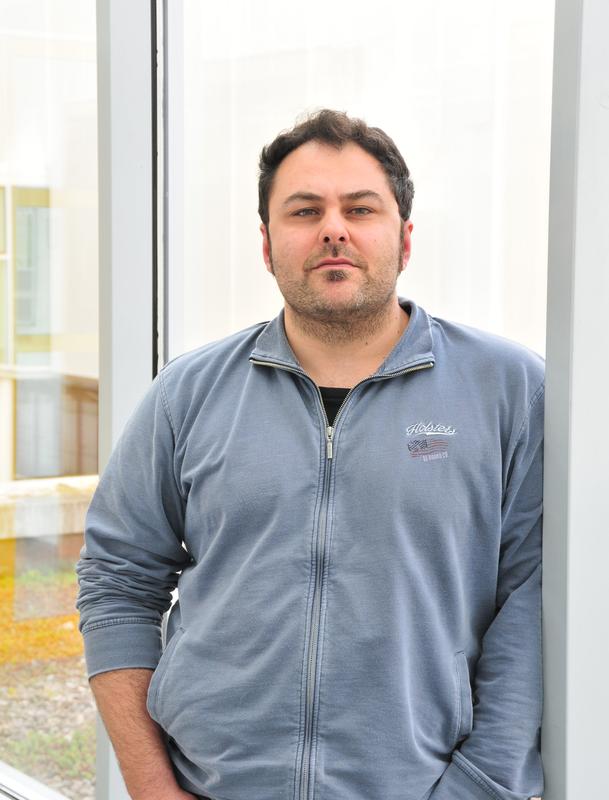

Francesco Neri, Junior Group Leader of the research group on “Epigenetics of Aging“ at Leibniz Institute on Aging (FLI) in Jena.
Photo: Evelyn Kästner / FLI
In recent times, our understanding of aging has deeply changed. Stem cells, that are the basis for organ regeneration throughout life, start to mutate in genetic regions that regulate the epigenome, i.e. the surface and structure of our genetic information.
These mutants become clonal, increasing the risk of disease and death. Roughly half of mankind aged 70 is affected by these alterations. Italian researcher Francesco Neri investigates the fundamentals of these processes and is now awarded the Sofja Kovalevskaja Award of the Alexander von Humboldt Foundation, one of the most highly endowed research awards in Germany.
He is one out of six international young scientists from the USA, Poland/Canada, Italy, Kenia, USA/Denmark and Iran/Australia who get the opportunity to build up their own research focus and research group at a German research institute – funded by up to 1.65 million Euro each. The awards will be given to the prizewinners on November 15, 2016, in Berlin.
Big Chance for a Young Scientist
“The Sofja Kovalevskaja Award provides young researchers with a great opportunity to follow their creative research approaches on a nearly independent basis“, Prof. Dr. Karl Lenhard Rudolph, Scientific Director of Leibniz Institute on Aging (FLI), emphasizes the importance of the research award. The funding of the Alexander von Humboldt Foundation enables Francesco Neri to build up a new junior research group on “Epigenetics of Aging“ at the Institute in Jena.
The new group is focusing on the functional characterization of epigenetic alterations associated to stem cell aging. Research aims at describing these epigenetic changes and how they are selectively accumulated over the years, e.g. altered methylation patterns of the DNA. Furthermore, the research focuses on the understanding of why and how aging-associated epigenetic alterations impact stem cell function and lead to a clonal dominance and cancer development.
“I’m really happy about this prestigious award”, Dr. Neri proudly explains. “As an internationally renowned research institute in the area of aging research, the FLI offers me an optimal research environment which enables me to fully concentrate on my own research focus.”
The Laureate – Francesco Neri
Dr. Francesco Neri was born in Italy in 1981. He studied molecular biology and gained his PhD in biotechnology at the University of Siena. After a period of research at Radboud University Medical Centre in Nijmegen, Netherlands, he returned to Italy, doing postdoctoral research at the Human Genetics Foundation in Torino, where he became a research assistant in 2015. Since July 2016, Dr. Neri has been heading a junior research group at FLI.
Sofja Kovalevskaja Award for Young Promising Scientists
The Alexander von Humboldt Foundation’s Sofja Kovalevskaja Award is named after the Russian mathematician Sofja Kovalevskaja and is one of the most highly endowed research awards in Germany. Funded by the Federal Ministry of Education and Research, it is granted to young exceptionally promising researchers from abroad in recognition of outstanding academic achievements. The award is designed to enable them to embark on academic careers in Germany by establishing their own junior research groups at research institutions in Germany. The Kovalevskaja Award is endowed with up to 1.65 million Euros.
More information on the award and the awarding ceremony can be found on http://www.humboldt-foundation.de/web/start.html.
Contact
Dr. Evelyn Kästner
Leibniz Institute on Aging – Fritz Lipmann Institute (FLI), Beutenbergstr. 11, 07745 Jena, Germany
Tel.: 03641-656373, Fax: 03641-656351
E-Mail: presse@leibniz-fli.de
Background Information
The Leibniz Institute on Aging – Fritz Lipmann Institute (FLI) is the first German research organization dedicated to biomedical aging research since 2004. More than 330 members from over 30 nations explore the molecular mechanisms underlying aging processes and age-associated diseases. For more information, please visit http://www.leibniz-fli.de.
The Leibniz Association connects 88 independent research institutions that range in focus from the natural, engineering and environmental sciences via economics, spatial and social sciences to the humanities. Leibniz Institutes address issues of social, economic and ecological relevance. They conduct knowledge-driven and applied basic research, maintain scientific infrastructure and provide research-based services. The Leibniz Association identifies focus areas for knowledge transfer to policy-makers, academia, business and the public. Leibniz Institutes collaborate intensively with universities – in the form of “WissenschaftsCampi” (thematic partnerships between university and non-university research institutes), for example – as well as with industry and other partners at home and abroad. They are subject to an independent evaluation procedure that is unparalleled in its transparency. Due to the institutes’ importance for the country as a whole, they are funded jointly by the Federation and the Länder, employing some 18,100 individuals, including 9,200 researchers. The entire budget of all the institutes is approximately 1.64 billion EUR. See http://www.leibniz-association.eu for more information.
http://www.leibniz-fli.de – Website Leibniz Institute on Aging – Fritz Lipmann Institute (FLI) Jena












